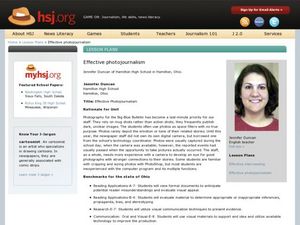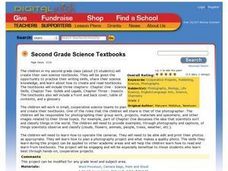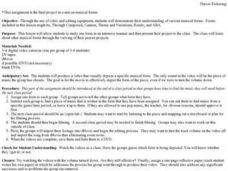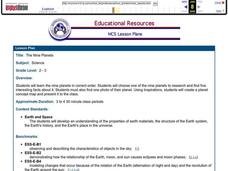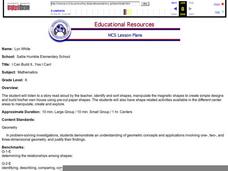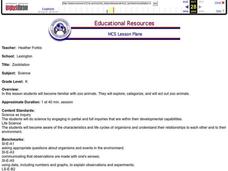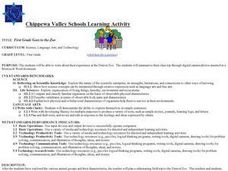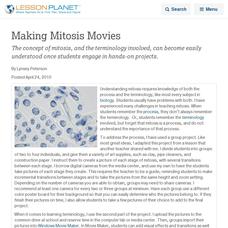Curated OER
Effective Photojournalism
High schoolers determine what makes a quality photo and take and edit appropriate photos that relate to their assigned articles. They select good pictures for their publication.
Curated OER
Zooming In!
Pupils observe an area of the schoolground, choosing a particular viewpoint or line of vision. At various times, students take photographs and videos of the observed area. Pupils write a news article based upon their observations.
Curated OER
Exploring Heroism
Students research heroism online. In this heroism lesson, students use the documentary of Heroes of Ground Zero to explore the theme of heroism. Students complete five days of activities to research and participate in activities that...
Curated OER
Social Studies: Grab Day at the Pueblo
Pupils develop a cultural understanding of "Grab Day." Using magazines, they clip out pictures to make collages of items thrown down to people on this day. Students label the items in their collages.
Curated OER
Building God's House
Students explore identifying some basic areas and items within the church and their importance. They participate in a church tour, building an interior and exterior model of a church with grounds (parking lot, cemetery, etc.), a church...
Curated OER
Region, History, and the Novel: Is Resistance Futile?
Students read a novel related to their geographical area and "Gone With The Wind". Using the first novel, they use the internet to research one aspect from it and relate it to their location today. They create a Hyperstudio or PowerPoint...
Curated OER
Using Photographs and Models for Drawings
Young scholars make drawings of their classmates in photographs.
Curated OER
Putting on Beowulf
Students read "Putting on Beowulf" then, in separate groups, choose a segment of Beowulf to perform. They prepare a performance either "live" or on videotape. After listening and watching each performance, Students evaluate each...
Curated OER
Choose Your Own Adventure
Students investigate the historical underground railroad. They also access technology to conduct research and write stories with the railroad as part of the historical fiction. The cumulative assessment is the creation of a book that...
Curated OER
Enhancing Social Skills and Vocabulary through Photography
Students in a special education classroom identify pictures of various living things. In groups, they role-play different roles to help them with their social and communication skills. To end the lesson, they take pictures of different...
Curated OER
Second Grade Science Textbooks
Second graders create their own science textbooks. They work in small, cooperative science teams to plan and create their textbooks. In addition, they photograph their group work, projects, materials and specimens, and other images.
Curated OER
Marty and Me
Students read 'Marty and Me' by Phyllis Reynolds Naylor. They compare their lives with Marty's life, which in most cases, is very different. They find similarities and differences and create a montage. They include information about...
Curated OER
Musical Forms
Students engage in an activity that is creating a video to accompany a chosen piece of music. They create a storyboard in order to plan out the video shooting. Then students listen to the music while filming takes place. Then they use...
Curated OER
The Rule of Thirds
Young scholars identify the rule of thirds and use it when taking photos. For this photography lesson, learners discuss dynamic photography and find example images from various sources. Young scholars discuss the rule of thirds and...
Curated OER
Get in Shape with Geometry
Using geoboards, computer programs, and hands-on manipulative materials, elementary schoolers engage in a study of two and three-dimensional geometric shapes. This lesson is chock full of good teaching ideas on the subject, and the...
Curated OER
The Nine Planets
A solid lesson on teaching the nine planets in our solar system is here for you. In it, young scientists learn the correct order of the planets, and they choose one of the planets to do a research report on. They must come up with five...
Curated OER
I Can Build It.....Yes I Can!
Kindergartners listen to a story read by their teacher, then use magnetic shape pieces to construct simple designes. They "build" their own house using pre-cut paper shapes. This age-appropriate lesson would be an excellent choice for...
Curated OER
Old Lady That Swallowed a Fly
Youngsters listen to the story, "There Was an Old Lady Who Swallowed a Fly." After discussing the story, going over new vocabulary, and repeating the rhymes in the story, they study the parts of a fly. They finish by creating a fly on...
Curated OER
Zoobilation
Youngsters become familiar with zoo animals. They sort them into categories, and choose an animal to act out. Two zoo centers are created in the classroom that have examples of the animals for the pupils to play with. Then, they choose...
Curated OER
The Very Hungry Caterpillar
Here is a good lesson on butterflies and caterpillars. After listening to The Very Hungry Caterpillar, young learners put cards that depict the life cycle of a butterfly in the correct order. There are some good ideas for center...
Curated OER
Shapes
Fifth graders explore shapes. They recognize and name two-dimensional and three-dimensional shapes. Pupils discuss the properties and criteria for each shape they find in real life and construct a Kid Pix project using pictures of the...
Curated OER
We All Live Together
First graders examine the lifestyle of classroom and family pets in their natural habitat. They determine the needs of plants and animals, and how those needs are met. They listen to read alouds, sing songs, and draw using computer based...
Curated OER
First Grade Goes to the Zoo
First graders summarize their trip to the zoo. In this summarizing lesson plan, 1st graders will study animals that they may see at the zoo including their characteristics and habitats. Once the trip is done, they create a word document...
Curated OER
Making Mitosis Movies
The concept of mitosis, and the terminology involved, can become easily understood once students engage in hands-on projects.


